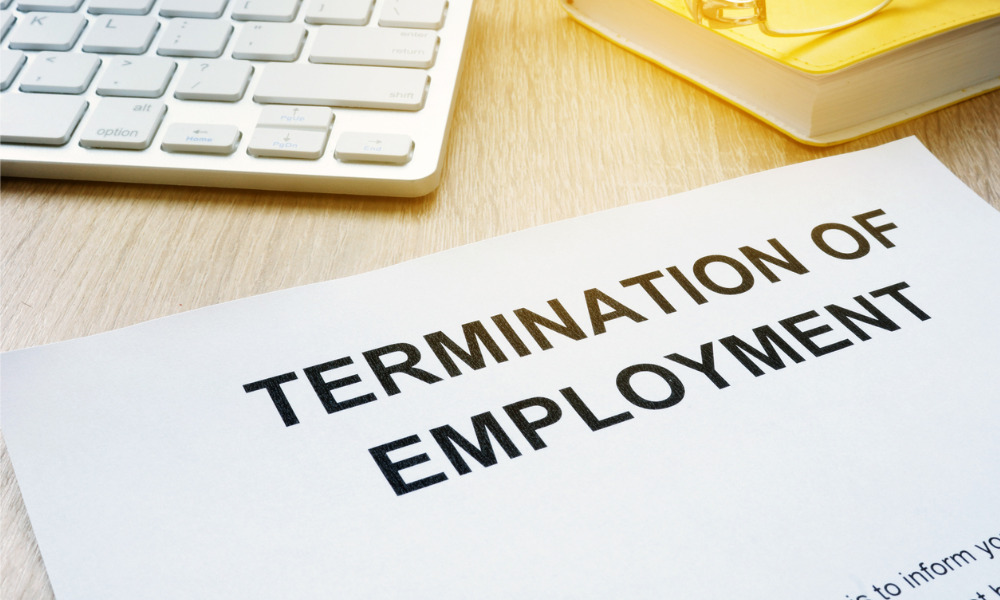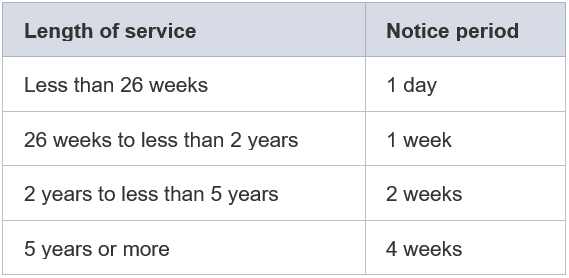
Can HR fire someone on the spot?

Can you fire an employee without any notice? Legally, it’s allowed in Singapore.
Employers are simply required to pay the worker salary in lieu of notice, as stated in the employment contract, according to the Ministry of Manpower (MOM). The amount owed to the worker is equivalent to what they would have earned if they served the notice period.
However, employers can negotiate for a waiver on the notice.
“Both parties may also agree to waive the notice period by mutual consent,” said MOM. “Such a waiver should be done in writing.”
If the notice period is not clearly stated in an employment contract, employers can use this as a guide:

This guide applies to all employees, whether they’re serving their probation period or after confirmation.
Read more: Can you fire an employee without giving a reason?
When is it legal to fire without any notice?
There are several scenarios where you can terminate someone with short notice in Singapore. MOM listed the following as ‘acceptable’ reasons:
As to what constitutes a breach of contract, MOM explained that an employee must be found absent from work for two straight working days without:
Read more: Employee fired after taking leave to care for terminally ill father
Firing employee for misconduct
In the case of misconduct, MOM stated that employees will forfeit any salary due in lieu of notice. However, the misconduct must be thoroughly investigated and clearly proven for employers to exercise their legal right to terminate without notice.
“If an employee has been accused of committing an act of misconduct, the employer should inform the employee and conduct an inquiry before deciding whether to dismiss an employee or to take other forms of disciplinary action,” MOM said.
Examples of misconduct include anything from theft, dishonesty, immoral conduct at work and insubordination.
MOM does not dictate how you conduct an inquiry, but they urged employers to carry out a fair and transparent process for all parties. This means employees need to be told what they’re accused of, as well as allowed the chance to present their case.
The personnel heading the inquiry should also be a third party other than the accused and accuser – in other words someone without bias.
In addition, you have a right to suspend the employee from work during the inquiry period. This is in line with the current Employment Act.
Some guidelines for suspension:
You will need to provide a clear explanation as to why you’re extending the suspension period. This should include details of the alleged misconduct, reasons for the extended inquiry, as well as an estimate of the end of the inquiry.
“If no misconduct is found, the employer must restore the full amount of any salary that was withheld during the suspension period,” MOM said.
If the misconduct is made clear after the inquiry, employers can proceed to terminate without notice. Alternative forms of disciplinary action include demoting the employee or suspending them from work without pay, not more than a week.
“Termination due to misconduct is a serious disciplinary action that should be carefully considered,” MOM said. “Employers must conduct a formal inquiry before taking any disciplinary action.”
MOM made clear that employees have a right to file a claim for a wrongful dismissal if they feel that they were terminated without just or sufficient cause. This is regardless of whether they’re fired with or without notice in Singapore, and on grounds of misconduct or otherwise.
Read more: Unfair and wrongful dismissals in Singapore: A guide
Can you fire without notice in Hong Kong?
Much like in Singapore, HRD found out that there are circumstances when employers can terminate without notice. In some serious cases, payment in lieu of notice may also be forfeited, stated Hong Kong’s labour department.
This include:
Additionally, the law clearly states that taking part in a strike is not a lawful ground for an employer to terminate the contract of employment without notice or payment in lieu.
“Employers should note that summary dismissal is a serious disciplinary action,” said the labour department. “It only applies to cases where an employee has committed very serious misconduct or fails to improve after the employer’s repeated warnings.”
Read more: Can you fire staff for a 'minor' mistake?
Employee dismissals: The required length of notice in Hong Kong
As for a straightforward case of termination, the city’s labour officials shared a guide on required notice periods, based on whether an employee is serving their probation or as a ‘confirmed’ staffer.
Employers can fire without any notice if workers are within their first month of probation. No payment in lieu of notice is required.
If they’re serving beyond their first month, the notice period must be at least seven days, with a salary is owed in lieu of notice if applicable – the amount is pro-rated and based on the employment contract.
Similar to Singapore, the notice period required will depend on the employment contract. And any premature dismissals should include a payment in lieu of notice. You must also give at least seven days’ notice to the employee.
If it’s not clearly stated in the contract, you are legally required to give at least one-month notice to the employee.
In Hong Kong, failure to termination payments, including salary in lieu of notice, is punishable by law. An employer may be required to pay interest on outstanding wages if they fail to clear wages within seven days of termination.
“An employer who wilfully and without reasonable excuse fails to pay termination payments when they become due is liable to prosecution and, upon conviction, to a fine of HK$350,000 and to imprisonment for three years,” said labour officials.